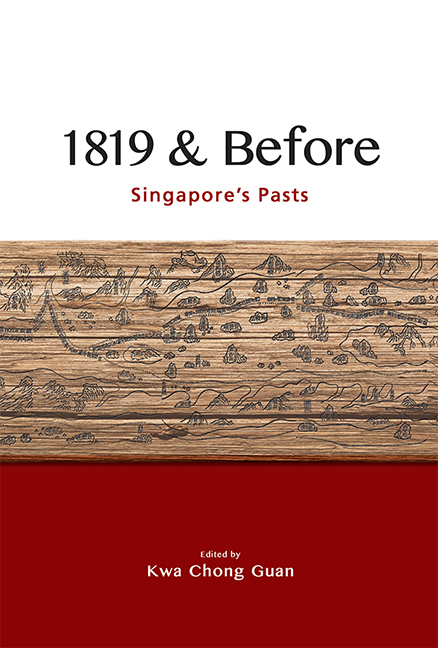Book contents
- Frontmatter
- Contents
- Foreword
- Acknowledgments
- Contributors
- 1 Introduction: Approaches to Singapore’s Past before 1819
- 2 Issues and Approaches to Studying Singapore before 1819
- 3 Regional Influences, International Geopolitics and Environmental Factors in the Rise and Demise of Temasek
- 4 The Mysterious Malay Jong and Other Temasek Shipping
- 5 The Orang Laut and the Negara Selat (Realm of the Straits)
- 6 Avoidance of Shipwreck in the Malay Annals: A Trope in Buddhist Narratives of Maritime Crossings
- 7 The Inception of Lion City
- 8 A Note on Amoghapāśa-Lokeśvara in Singapura
- 9 Portuguese and Dutch Records for Singapore before 1819: An Overview
- 10 Zheng He’s Navigation Methods and His Visit to Longyamen, Singapore
- Bibliography
- Index
8 - A Note on Amoghapāśa-Lokeśvara in Singapura
Published online by Cambridge University Press: 09 October 2021
- Frontmatter
- Contents
- Foreword
- Acknowledgments
- Contributors
- 1 Introduction: Approaches to Singapore’s Past before 1819
- 2 Issues and Approaches to Studying Singapore before 1819
- 3 Regional Influences, International Geopolitics and Environmental Factors in the Rise and Demise of Temasek
- 4 The Mysterious Malay Jong and Other Temasek Shipping
- 5 The Orang Laut and the Negara Selat (Realm of the Straits)
- 6 Avoidance of Shipwreck in the Malay Annals: A Trope in Buddhist Narratives of Maritime Crossings
- 7 The Inception of Lion City
- 8 A Note on Amoghapāśa-Lokeśvara in Singapura
- 9 Portuguese and Dutch Records for Singapore before 1819: An Overview
- 10 Zheng He’s Navigation Methods and His Visit to Longyamen, Singapore
- Bibliography
- Index
Summary
Is the Sulalatus-Salatin, or the Malay Annals/Sejarah Melayuas Stamford Raffles and John Leyden have popularized the text, an anecdotal history of the Melaka and Johor sultanates, in perhaps ways not too different from Charles Buckley's 1902 Anecdotal History of Old Times in Singapore, which is still referred to today? Or is the Sulalatus-Salatin a literary text to be read and interpreted within the genres of Malay literature and literary structures for these differing genres of literature? Winstedt led a pioneering generation of scholars to historically differentiate these genres of Malay literature evolving from folk literature through Hinduand Javanese-influenced genres to culminate in Islamic literature, and sought to read the Sulalatus-Salatin as a historical chronicle. Today we are breaking away from Winstedt's search for “objective vocabulary”in the Malay literary texts to studying the structuralist poetics of Malay literature and reconstructing the literary systems framing classical Malay literature.
This note assumes the historicity of Melaka's founding by Iskandar Shah as claimed in the Sulalatus-Salatin, and that he is identical with the Paramjçura the Portuguese recorded as the founder of the city they conquered, and the Pai-li-mi-su-la who the Ming records state lead a mission to China in 1411. The issue of this note is how were the circumstances of Melaka's founding by Iskandar Shah to be recollected and recorded in the Sulalatus-Salatin? Could the tragic beginning of Melaka—which Alfonso de Albuquerque and other Portuguese officials learnt from their local informants, that the city they conquered was established by a renegade prince, a Paramjçura, who fled his home Palembang after an abortive rebellion against his Javanese overlords and sought refuge in Temasek, where he assassinated his host, and had to again flee—be an auspicious start for a rising Melaka?
The narrator of what was to become the Sulalatus-Salatin had the challenging task of writing contemporary history that he and his listeners experienced or would be aware of some thirty years earlier. The first six chapters of the Sulalatus-Salatin are therefore read as an intent to rectify this tragic beginning of Melaka with a more befitting genealogy for the founder of Melaka and his descendants.
- Type
- Chapter
- Information
- 1819 & BeforeSingapore's Pasts, pp. 77 - 88Publisher: ISEAS–Yusof Ishak InstitutePrint publication year: 2021

